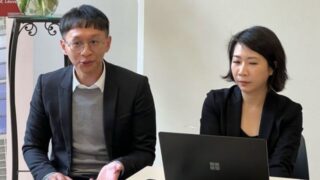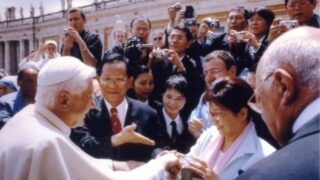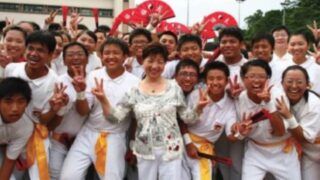From the pre-Parliament “Parade of Faiths” to their Global Prayer for World Peace, it was impossible not to notice the large and smiling contingent of Tai Ji Men dizi.
by Massimo Introvigne


The Parliament of the World’s Religions was first held in Chicago in 1893. It is both the oldest and the largest inter-religious gathering in the world. The first edition was organized as part of the World’s Colombian Exposition, organized to celebrate the 400th anniversary of Christopher Columbus’ landing in America in 1492, and was the largest among the gatherings that took place during the event. In retrospective, scholars acknowledge that the 1893 First Parliament of the World’s Religions inaugurated a new era of dialogue and understanding between religions. It also persuaded many Americans and Westerners that the ancient religious traditions of Asia were not mere curiosities but had a substantial contribution to offer to the cause of interreligious dialogue and world peace.
Although several prominent spiritual masters came from Asia to Chicago in 1893, including Sri Lanka Buddhist leader Anagarika Dharmapala, Japanese Zen roshi Soyen Shaku, and Hindu monk Swami Vivekananda, several American media declared the lectures of Virchand Gandhi, a scholar and lawyer representing the Jain religion of India, as the most impressive. It is significant that today the Chair of the Board of Trustees of the Parliament of the World’s Religion, which includes representatives of many different religious traditions, is a Jain, Nitin Ajmera.


The 2023 edition of the Parliament, attended by more than 7,000 participants from all continents and faiths, was organized again in Chicago, with the general theme “A Call to Conscience: Defending Freedom and Human Rights.” Tai Ji Men is a spiritual movement rooted in esoteric Taoism but welcoming people of all religions, which puts conscience at the center of its teachings and path, and promotes human rights globally. It participated with a booth and two special events. A delegation of more than one hundred Tai Ji Men dizi (disciples) was personally led by their Shifu (Grand Master), Dr. Hong Tao-Tze.
Tai Ji Men also participated in the pre-Parliament “Parade of Faiths,” where it was one of the most applauded and photographed groups. Their performers presented heavenly animals, including the Tai Chi dragon, the phoenix, the unicorn, and the auspicious lion; and the Eight Immortals and Heavenly Officials of the Taoist tradition.


The Tai Ji Men booth received thousands of visitors, and hosted several ceremonies where luminaries attending the conference rang the Tai Ji Men Bell of World Peace and Love. Many visitors also wrote down their wishes for peace and placed them on the billboard called Tree of Life. On August 14, those who rang the Bell included former U.S. congressman Bobby Rush; Eric Roux, Chair of the European Interreligious Forum for Religious Freedom; Preeta Bansal, Chair of the Global Council of Trustees of United Religions Initiative; Steve Sarowitz, a well-known Bahá’í film producer; and the British Sikh leader Bhai Sahib Bhai Mohinder Singh Ahluwalia, OBE, KSG. On August 15, they were joined by Great-Grandmother Mary Lyons, an elder of the Native American people Ojibwe and the founder of the Minnesota Coalition on Fetal Alcohol Syndrome; on August 16, by Rabbi David Saperstein, former U.S. Ambassador-at-large for International Religious Freedom; and on August 17 by Jerry White, Executive Director of United Religions Initiative and co-laureate of the 1997 Nobel Peace Prize; Khaled Abu Awwad, a Palestinian peace activist awarded in 2011 with the UNESCO Madanjeet Singh Prize for the promotion of nonviolence and tolerance; and Phyllis Curott, a lawyer specialized in religious liberty issues and Goddess Spirituality priestess.


On August 16, the Tai Ji Men Global Prayer for World Peace was the most well-attended event of the Parliament apart from the opening and closing plenary ceremonies. The event opened with the Blessing Ceremony of the Heaven. Through music, dances, and martial art performances, the story was told of how when the universe was formed, Heaven and Earth were in order. Through selfishness and the five poisons of the heart, evil entered the world. Tai Ji Men works to return the world to the original order by restoring the primacy of conscience.
The Bell of World Peace and Love is a microcosm embodying in itself this great history of the macrocosm. Dr. Hong solemnly rang it, followed by the undersigned. I had already rung the bell on August 8, 2022 at the Tai Ji Men Qigong Academy in Walnut, California. I was both humbled and honored when I was asked to deliver a prayer for world peace and received a Mini Golden Bell as an acknowledgment for my work on behalf of religious liberty.


Nitin Ajmera, Chair of the Board of Trustees of the Parliament of the World’s Religion, also rang the Bell and congratulated Tai Ji Men for the ceremony. He expresses the wish, “May the vibration of the Bell resonate in all our hearts to create a world full of love, compassion, and gratitude for all.” At the end, all participants, representing more than a dozen different religions and spiritual traditions, hugged their neighbors and, visibly moved, prayed together for world peace.


The Global Prayer ceremony would not have been remarkably successful as it was without the marvelous performances of Tai Ji Men dizi, who brought to Chicago their famous hand-made dragons and their not less famous “angels,” also offering breath-taking dances and martial arts exercises.


At the 2023 Parliament of the World’s Religions, as I can attest having participated in previous editions, Tai Ji Men certainly made a difference. My wish is that the Parliament may in turn make a difference for Tai Ji Men, fueling the enthusiasm of dizi, making them more well-known and acknowledged throughout the world, and advancing their campaigns for peace, love, conscience, and justice.











